If you’re a fan of the classic Mountain Dew soda, you’ll definitely enjoy its energy drink version that still maintains the great taste of the original soda.
Mountain Dew Kickstart does its job pretty well for an energy drink that’ll help you stay awake, alert, and power through your daily activities. But, what exactly goes inside a can of this popular energy drink?
Short answer: A 16 fl.oz can of Mountain Dew Kickstart contains 90mg of caffeine, 20g of sugar and 80 calories.
For a more in-depth analysis of its caffeine and ingredients, let me take you on a deep dive into the article below.
Contents
Mountain Dew Kickstart Nutritional Facts
To get started, here are the nutritional values of a 16 fl.oz can of Mountain Dew Kickstart:
| Typical Values (Standard Serving) | Mountain Dew Kickstart (16 fl.oz) |
| Energy | 80 calories |
| Protein | 0g |
| Fat (Of which Saturated) | 0g (0g) |
| Carbohydrates (Of which Sugars) | 0g (0g) |
| Caffeine | 90mg |
| Sodium | 170mg |
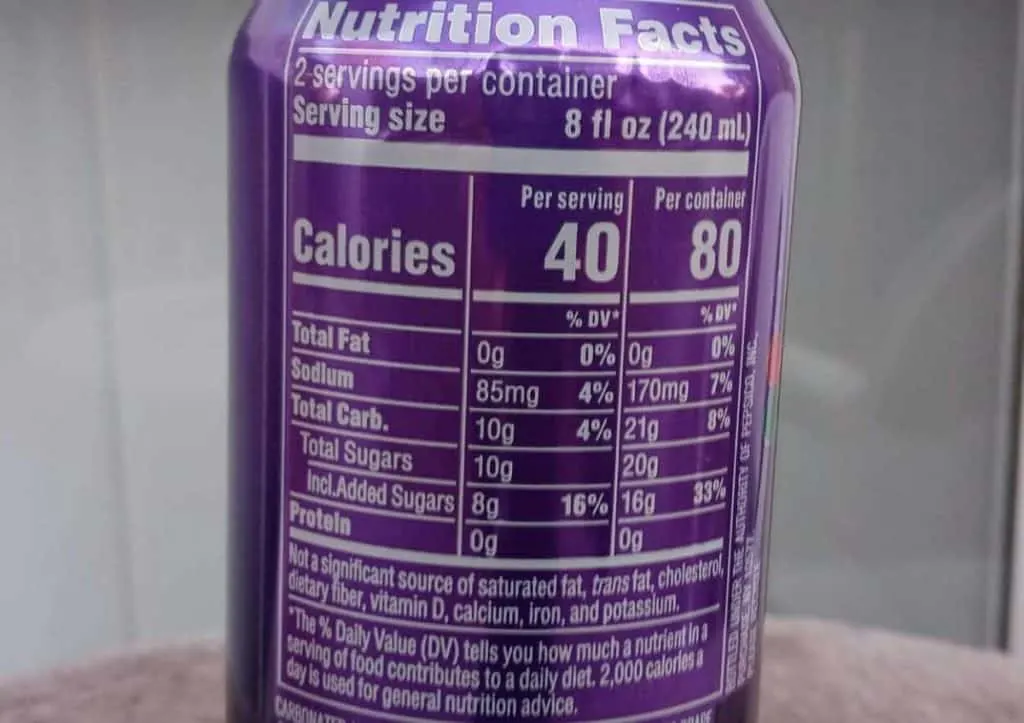
How Many Calories Are There In A Mountain Dew Kickstart?
A standard 16 fl.oz can of Mountain Dew Kickstart contains 80 calories, which is a pretty average amount for an energy drink its size.
For comparison, a 16 fl.oz can of Monster Energy has 210 calories, whereas an 8.4 fl.oz can of Red Bull contains 110 calories, which I think is an insanely high amount considering its small size.
Considering that healthy adults are recommended to keep a daily calorie limit of around 2000 to 2400 calories for women and 2400 to 3000 calories for men, the 80 calories in Mountain Dew Kickstart seems way healthier. It definitely won’t leave such a big dent in your daily calorific intake.
That said, if you’re looking for an energy drink that’ll provide you with the right amount of calories to burn off during exercise, this drink makes a good option for that.
But if you have a more sedentary lifestyle, this energy drink may not be suitable for you. It’s important to note that reducing calories doesn’t necessarily equate to weight loss, according to research.
There are what you call good and bad calories. While Mountain Dew Kickstart is low in calories, it’s not considered good calories because it doesn’t include natural ingredients.
Thus, I highly suggest you keep your consumption to a minimum and choose an energy drink that will complement your lifestyle.
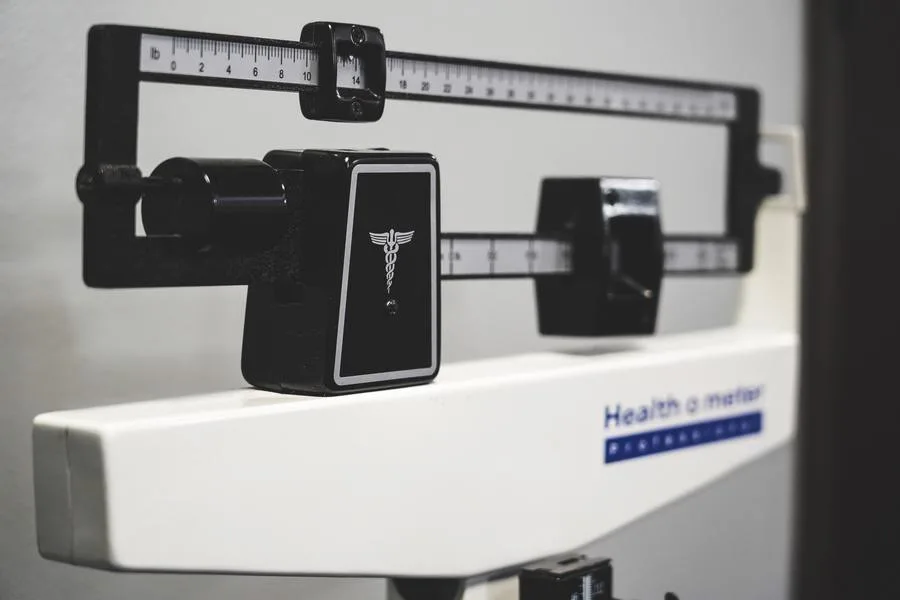
Monster Dew Kickstart Ingredients
These are all the ingredients you can find in a 16 fl.oz can of Mountain Dew Kickstart:
- Carbonated Water
- High fructose corn syrup
- White grape juice concentrate
- Citric acid
- Sodium polyphosphates (Preservative)
- Natural flavor
- Potassium sorbate (Preservative)
- Caffeine (90mg)
- Potassium citrate
- Potassium chloride
- Gum Arabic
- Acesulfame potassium (Artificial Sweetener)
- Sucralose (Artificial Sweetener)
- Red 40 (Coloring)
- Calcium disodium EDTA
- Sucrose acetate isobutyrate
- Salt
- Blue 1 (Coloring)
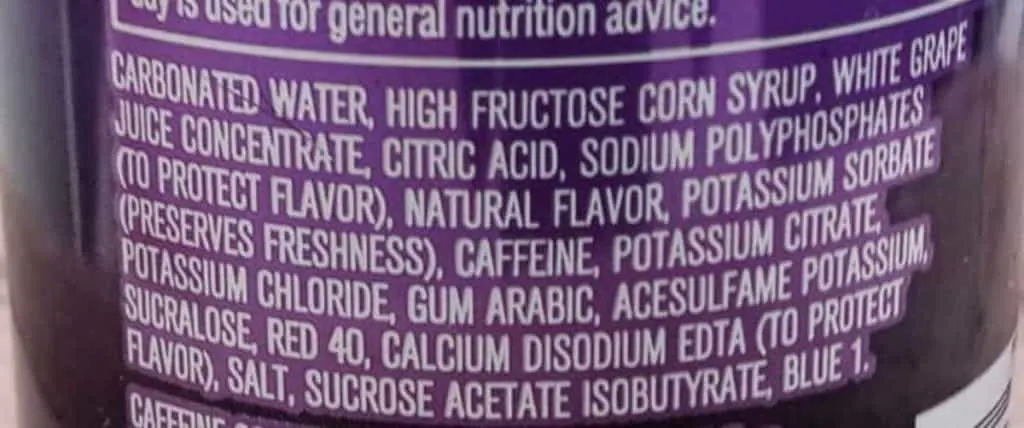
How Much Caffeine Is There In Mountain Dew Kickstart?
Mountain Dew Kickstart contains 90mg of caffeine, which is an average amount for an energy drink its size.
Caffeine is a great ingredient to help us stay active and awake throughout the day. People drink caffeine to get in a better mood, suppress their appetite, and stay alert throughout the day.
No wonder it’s the main ingredient in all energy drinks!
For reference, the 90mg of caffeine in Mountain Dew Kickstart falls way below the daily recommended caffeine limit of no more than 400mg of caffeine for healthy adults. But if you’re a regular caffeine drinker, this amount might not do the trick for you.
While you may be tempted of going for multiple can of Mountain Dew Kickstart to get the energy boost, I wouldn’t go overboard because too much caffeine can bring about health risks such as:
- Anxiety
- Jitters
- Inability to focus
- Gastrointestinal discomfort
- Insomnia
- Irritability
- Heart palpitations
Moreover, caffeine contains addictive properties that may result in withdrawal syndrome.
Research shows that caffeine produces dose-dependent symptoms and intoxication that may develop with overconsumption.
I personally consume between 50mg – 100mg of caffeine per drink, so Kickstart has a good amount of caffeine for my preference. Too much caffeine may cause me to feel jittery, so 90 mg is enough for me.
Although Mountain Dew Kickstart has only 90mg of caffeine, which is less than stronger energy drinks brands, please drink in moderation if you plan to include it in your regular diet.
How much caffeine is in a kickstart compared to coffee?
A kickstart contains about the same amount of caffeine as coffee. A kickstart contains about 95 mg of caffeine, while coffee contains about 95 mg of caffeine. Some people may find that kickstart helps them feel more energized and awake, while others may prefer the taste of coffee.
Nevertheless, drinking coffee and kickstarting excessively alike pose serious health risks. This includes increased heart rate, increased blood pressure, insomnia, anxiety, and restlessness.
How Much Sugar Is In A Mountain Dew Kickstart?
Mountain Dew Kickstart contains 20g of sugar, making it healthier than Monster and Red Bull, with 54g and 27g of sugar, respectively.
According to the AHA, the daily sugar intake shouldn’t exceed 25g of sugar for women and 36g of sugar for men.
While Mountain Dew Kickstart has less than the recommended daily limit, you should still be cautious as it’s just as easy to end up overconsuming it.
It’s a given that sugar’s a great ingredient that adds sweetness and flavour to our favourite food and drinks. However, if you’re not mindful of your intake, it can lead to side effects such as:
- Acne
- Cavities
- Weight gain
- Heart disease
- Diabetes
- Increased risk of depression
- Increased risk of kidney disease
Hence, it’s best to keep in mind that the daily limit recommended by health experts is the total amount of sugar you can consume a day.
Aside from Mountain Dew Kickstart, you also need to consider the sugar you consume from regular foods and drinks throughout the day.
My advice is to stick to only one can of Mountain Dew Kickstart a day and have no more than 3 cans in a week for the sake of your health.
Other Ingredients
High Fructose Corn Syrup (HFCS)
High fructose corn syrup (HFCS) is an added sugar based on corn syrup, and most of the food we consume, like processed foods, juices and sodas, contains high levels of HFCS.
Based on the ingredients list, Mountain Dew Kickstart doesn’t contain any fruits hence why there’s HCFS in this energy drink.
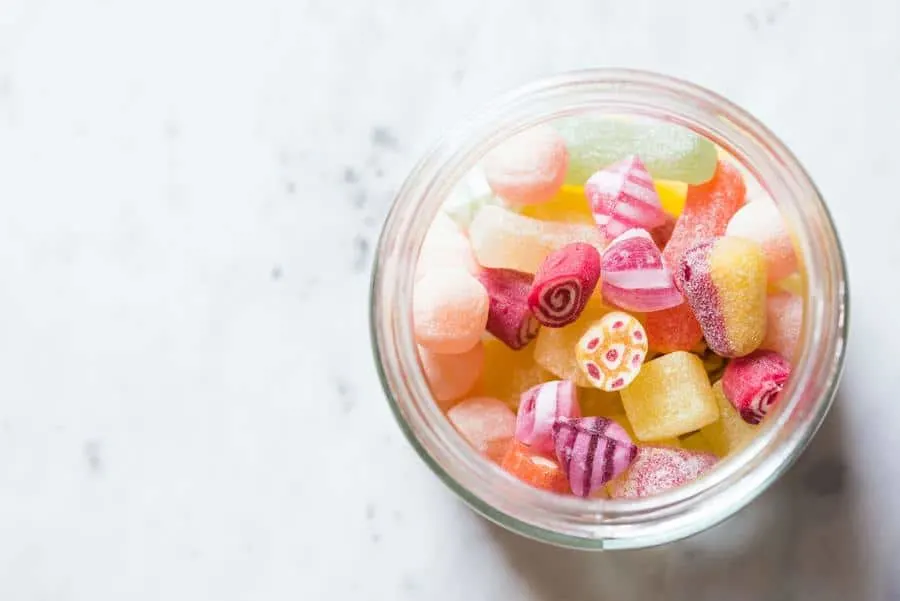
Though it’s been added to regular foods for many years now, research shows that too much HFCS leads to several health risks such as heart disease, diabetes, and even fatty liver disease.
Actually, many athletes and those who are health-conscious are already careful about HFCS consumption. Most of them prefer all-natural!
All in all, if you keep your consumption to a moderate amount and don’t go overboard, I’m sure you’ll be fine.
Sucralose
In a nutshell, sucralose is an artificial sweetener that has zero calories and it’s also found in Mountain Dew Kickstart.
Sucralose goes through an extensive chemical process that makes it 600 times sweeter than regular sugar without leaving you the guilt of consuming sweet stuff due to its calorie-free nature.
Because sweeteners are verified as safe to use by the FDA, they’re popular for being a sugar substitute. That explains why they’re usually marketed as healthier alternatives.
Scientists, however, have yet to research if they’re indeed beneficial for weight loss. That said, I wouldn’t be too keen on sucralose because experts claim that it could cause dental problems eventually.
But of course, as long as you know how to control yourself with sweeteners and not include them in every single meal, there’s nothing much to worry about here.
Citric Acid
You can find citric acid in natural fruits like lemon, lime, oranges, and tangerines. That explains why people use it as a flavouring and preserving agent that adds the tangy, tart, and sour flavour to food, including the Mountain Dew Kickstart.
That said, many experts suggest that natural citric acid ingredients are good for the kidneys.
There’s also the manufactured form of citric acid which serves the same purpose as the natural ones but it’s derived from cane sugar, corn, or wheat.
Manufactured forms of citric acid are commonly found in processed food, cleaning agents, and nutritional supplements.
Potassium Chloride
Potassium chloride is a flavour enhancer and stabilizing agent. Plus, it’s also believed to prevent and treat low blood levels.
Besides baby formulas, cereals, and frozen goods, it’s also found in energy drinks like Mountain Dew Kickstart to preserve their taste and flavour.
However, large amounts of potassium can lead to serious health risks like:
- Nausea
- Vomiting
- Diarrhoea
- Gas, stomach pain
Hence, to avoid these uncomfortable side effects, always consume it in healthy doses.
What Are The Health Risks Of Mountain Dew Kickstart?
The health risks of Mountain Dew Kickstart are brought about by the negative side effects of excessively consuming caffeine and sugar.
Although caffeine seems to be good for your wellbeing as it puts you in a better mood, it can also cause you to feel negative effects like anxiety and dehydration, especially if you have a low caffeine metabolism.
Plus, you wouldn’t want to be caffeine-dependent and, later on, suffer the side effects that go with it. Caffeine withdrawal is difficult as it leads to depression, and migraines, which will make you unproductive instead.
Similar to caffeine, sugar is also a double end sword. What can cause you to feel happy can later take a toll on your health! Not to mention, it also contains addictive properties.
As you probably already know, diabetes is one of the world’s leading disease, and you’ll have a higher risk of being a victim if you consume high amounts of sugary foods and drinks regularly.
Unfortunately, this applies to energy drinks like Mountain Dew Kickstart, so I highly suggest you keep your intake to a minimum.
Does Mountain Dew Kickstart have Taurine?
Mountain Dew Kickstart doesn’t contain taurine.
But first, what’s taurine?
Taurine is an amino acid that functions as an important part of the body’s metabolic processes. You can find it in meat, fish, dairy products, human milk and can also act as a supplement for athletes.
It’s no surprise that many energy drinks contain this ingredient, some even have 2,000mg worth of taurine.
However, a study found that overconsumption of taurine mixed with caffeine poses can cause cardiac arrest. Fortunately, Mountain Dew Kickstart doesn’t contain taurine!
If you’re interested to find out more about taurine and how it affects the body’s energy levels, check out the video below:
Is Mountain Dew Kickstart Bad for You?
Like every foods and drink we consume, Mountain Dew Kickstart is only bad for you if you regularly consume it excessively while also not practising a healthy lifestyle.
If taken in healthy doses, caffeine offers plenty of benefits, such as enhancing your physical performance and improving brain functions, concentration and memory.
That said, I don’t see anything wrong with consuming just one can of Mountain Dew Kickstart a day as it only has 90mg of caffeine per serving.
Although its sugar content can easily make you exceed the daily sugar limit, especially if you’re a woman.
It’s also worth noting that the average Americans consume about 71g of sugar a day. I’m not saying that this is safe, but apparently, people go above the recommended sugar limit every day.
My take on this is having just one can of Mountain Dew Kickstart isn’t bad for you, provided you have it occasionally and watch your overall sugar intake.
But of course, it’s always a good idea to consult with your health specialist if you’re still unsure how this energy drink can affect your diet.
Is Mountain Dew discontinuing kickstart?
Kickstart is still on the market and can be found in the majority of convenience stores. Production has not been discontinued by Mountain Dew.The beverage contains Mountain Dew, fruit juice, and caffeine.
This product was launched in 2013 as Mountain Dew’s way of introducing energy drinks to sports and gym enthusiasts.
Final Thoughts
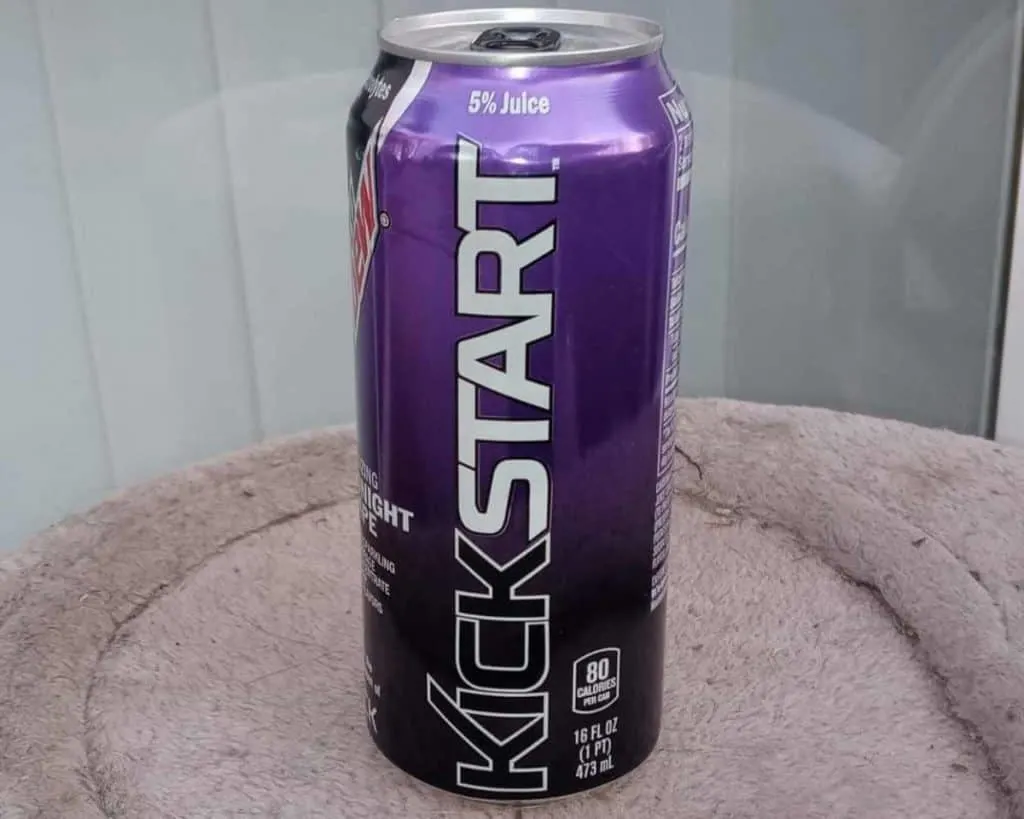
There’s no denying that Mountain Dew Kickstart contains ingredients that may be harmful to your health, especially with the added sugars included. However, if you drink in moderation, then all should be well.
In my opinion, its caffeine content of 90mg is enough. Though it might not be as strong for those with a higher tolerance, I still suggest keeping your daily intake in moderation to avoid unnecessary side effects.
That said, it’s the 20g of sugar Mountain Dew Kickstart contains that you should be more cautious about as regular consumption can leave you with long-term health problems.
To avoid putting your health at risk, it’s best to drink Mountain Dew Kickstart moderately and responsibly.
Other Articles
- Mountain Dew Kickstart Nutrition Facts
- Is Mountain Dew Kickstart Vegan?
- Does Mountain Dew Kickstart Actually Work?
